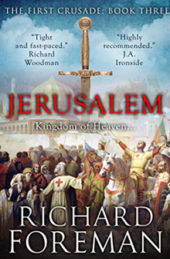Lionheart is the first novel in a new medieval set series that follows the life and achievements of Richard, Coeur de Lion. Beginning in 1179, the book tackles Richard’s life before the crusades against a backdrop of political intrigue and family in-fighting. Interestingly, it is told not from Richard’s point of view, but from that of a young political hostage, an outsider. Ben Kane is the bestselling author of several series set in classical history including Eagles of War, Clash of Empires and Hannibal. J. A. Ironside, the author of The King’s Knight series, interviewed him about his process and the historical period.
Richard the Lionheart is one of the best-known figures in medieval European history. Could you start by talking a bit about the book and what drew you to write about this period? What specifically drew you to Richard?
Lionheart is the first of a trilogy set in the late 12th century. Although the story follows the life of Richard the Lionheart, it is told from the point of view of Ferdia AKA Rufus, a young Irishman. I did this for two reasons: it is easier to have a fictional character whose story runs parallel with the historical person (one can invent incidents etc. without taking liberties with real events). The second is that I have wanted for what seems forever to write an Irish character!
I am known for my Roman historical fiction, but I have always wanted to write other periods. When my new publishers Orion indicated that they were happy for me to move into a new era, I was delighted.
My first recollection of Richard the Lionheart is as a character in Ronald Welch’s YA novel Knight Crusader. That novel was one of my favourites as a boy, and it had a lasting influence on me, like Rosemary Sutcliff’s The Eagle of the Ninth. You said yourself, he is one of the best-known figures in medieval history, and by far the most iconic battle leader. Some of his deeds defy belief, yet are attested by both Christian and Muslim chroniclers of the third crusade. His story screamed out at me to be written, so I was driven more by the desire to write about Richard than the 12th century itself.
The narrator of Lionheart is a young Irish nobleman, handed over as a hostage to ensure the good behaviour of his rebellious family. What led you to create Ferdia, or Rufus as he becomes known? Did you find that having your main character start as a noble hostage gave you the best of both worlds in terms of character arc?

Ben Kane
I was always tempted to write an Irish character into my Roman novels but felt it stretched credibility too far. With Lionheart, opening as it does ten years after the Norman invasion of Ireland, I felt the opportunity was waiting to be seized. In answer to your question, simply, yes. It was known for ordinary men to be knighted, but it was rare. I wanted a character who could become one of Richard the Lionheart’s close associates without asking readers to suspend their disbelief too much.
The marriage of Aoife Ní Diarmait, daughter of the King of Leinster, to Richard (Strongbow) de Clare, 2nd Earl of Pembroke, arguably changed the course of Irish history and Ireland’s ruling class. Lionheart begins sometime after those events, but they have shaped Ferdia and the world he grew up in. How much does Ferdia’s ambivalence over family loyalty influence his character journey?
It influences his journey in a big way—which was my purpose from the start. I have long wanted to have a central Irish character, and having Ferdia in the English royal court meant that he had to have a real struggle with his loyalties.
There was clearly a lot of conflict within Henry II’s family. How much do you think family politics shaped Richard, both as a historical figure and as a character in Lionheart? Was being a younger son a catalyst for Richard to prove himself and excel as a soldier? What is your opinion on younger sons not being educated in statecraft and prepared to rule in the way that the oldest son was? (To a modern eye, with the benefit of hindsight bestowed by centuries of historical knowledge, it looks like a common medieval oversight, since younger sons often outlived older brothers and found themselves crowned king without the years of preparation.)
It’s difficult to know for sure, given the lack of historical record, but it’s hard to believe that the massive conflicts and bitter rivalries in Richard’s family did not affect him in a major way. As the younger of two brothers, I know there can be a fierce desire to do everything that the older sibling does, to feel of less worth than that person, and to want to outdo what they have done. I’m not sure I agree with it being a catalyst for Richard to excel as a soldier, because his martial abilities and sheer combativeness were quite unique—I think those were just part of him. He loved to fight!
Conflicted loyalties and moral ambiguity in the face of survival are strong themes in the book. Can you say what drew you towards those themes?
Sharp observation! It’s something I have long tried to bring across in my books, because ‘all good’ heroes and ‘all bad’ evil characters are boring—and can easily appear as cardboard cutouts. It’s also a reality—all of us have good and bad in us, are capable of cruelty and kindness—and makes characters more likeable/engaging.
One of the dilemmas historical fiction writers face is the difference in mindset between a modern audience and the people of a historical period. How do you balance creating likeable and interesting characters, who are accessible to a modern reader, with historical authenticity? How do you create dialogue comprehensible to your readers without being anachronistic to the era?

J.A.Ironside
It’s a juggling act. To portray characters accurately (in as much as that is possible) risks creating thoroughly unlikeable people. As a fellow Roman author says, the average Roman man of two thousand years ago was racist, homophobic and misogynist—and that’s just for starters! I like to think that I get a good balance, laying out the world so that readers understand that because, say, slavery was an everyday part of life, it doesn’t make a main character ‘bad’ for not objecting to it. Every so often, I throw in a scene that shocks the reader into realising that the moral code of the hero they identify with is quite different to their own. (I look forward— sort of—to readers’ reactions to Richard’s treatment of his Muslim prisoners at Acre in 1191!)
It’s easy to look back at historical events and ascribe positive or negative values to them. Many people would now say that the crusades were senseless and brutal. However, at the time, ‘taking the cross’ and going on crusade was seen as a high moral duty that went beyond simple ideological differences. How difficult was it to write this in a way that your readers would find accessible?
I made it quite clear that everyone believed in God—atheists were almost unknown in medieval times—and emphasised the shock and horror felt by Christians at the desecration of their holiest shrines by unbelievers. I didn’t find it difficult, and I hope that my efforts were convincing.
There’s something of the rogue in Ferdia. He has a mischievous side and is quite willing to employ it to get his own back on tormentors. This helps to add a layer of humour to Lionheart. I’ve always felt that historical fiction can be funny without devolving into absurdist fiction. How far, if at all, do you agree and how important is it to you to add humour to your books?
I’m glad that you liked Ferdia’s sense of humour! Ever since an old friend (who often serves as a critic of my novels before publication) told me that there was no humour in my first three books—’they’re a bit grim,’ he said— I have tried hard to inject humour into my novels. People have loved laughter and jokes throughout history, so I feel it is realistic to use humour in historical fiction works.
Finally, if you could write a book set in any historical period, regardless of market and how often the subject had been tackled before, when would you be writing about? And who would your main characters be?
I have a great wish to write a series set during the Irish War of Independence (1919-21), using characters on both sides of the conflict. I have so much family history that I could include, from the British and Irish points of view.
Ben Kane is the author of Lionheart and Crusader, the sequel.







